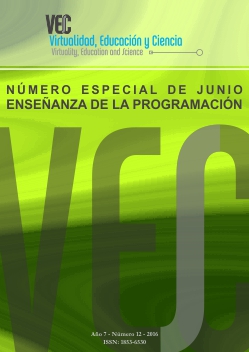A game-based approach for learning a programming language
DOI:
https://doi.org/10.60020/1853-6530.v7.n12.14739Keywords:
computer programing, gamification, serious games, learning strategiesAbstract
Many of the students in our classrooms belong to the gamer generation. Because of the success of digital games as entertainment products as well as formidable motivators, the possibility of using them in educational settings is being contemplated from a while. In this research we try to identify a set of digital games with the potential to be used to design learning activities, specifically to learn computer programming concepts like: algorithms, variables, and control structures. Based on the contents and sequencing of learning, two games were chosen and incorporated into the activities of a workshop on introduction to programming in order to analyze their usefulness. The workshop was designed on the Moodle platform using a gamification approach. Here, we present a selection of serious games focused on computer language programming, the selection criteria of two of them and their use in a workshop for incoming students, as well as some of the results obtained from this experience.Downloads
Download data is not yet available.
Downloads
Published
2016-07-01
How to Cite
Astudillo, G. J., Bast, S. G., & Willging, P. A. (2016). A game-based approach for learning a programming language. Virtuality, Education and Science, 7(12), pp. 125–142. https://doi.org/10.60020/1853-6530.v7.n12.14739
Issue
Section
Innovation and Experiences
License
The generation of derivative works is allowed as long as it is not done for commercial purposes. The original work may not be used for commercial purposes.


